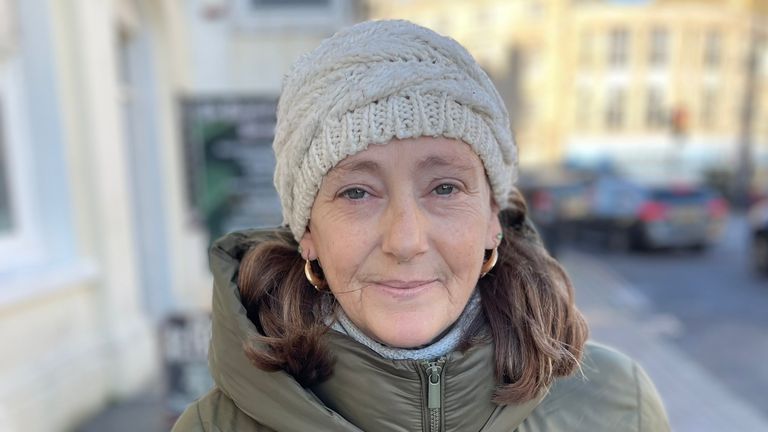
Health inequalities mean people are not living as long in England's coastal towns - and Hastings has the worst record for health inequality.
Issues like addiction, mouldy housing stock, poverty and deprivation put pressure on hospitals and put off doctors from staying put, despite millions of pounds worth of investment.
Anne Marie started drinking as a teenager.
Then three decades later, her addiction brought her to the brink of death.
"I got really sick and was taken to hospital," she recalls.
She had a blood clot on her lung and her liver had stopped working.
"They had to round all my family up to say goodbye," she says, her voice shaking at the memory.
But somehow, she survived.
However, drinking excessively for more than 30 years has still taken a huge toll on her body. She has arthritis in her hips and walks slowly using a walking stick.
Anne Marie is now two years sober.
"If I drink again, it will kill me. I know that and I'm not ready," she says.

Hidden hospital pressures at scenic seaside
In Hastings, where Anne Marie lives, it's a crisp winter day. The sunlight shimmers on the surface of the waves crashing on the seafront.
Nearby an old man perches on a bench reading a book, as a woman jogs by with her dog.
But this picturesque seafront is a stark contrast to the scenes of despair playing out just yards away.
Tents are erected in the town centre by the homeless. People shelter in sleeping bags on the seafront.
A man and a woman drink lager from cans in stony silence.
In one direction, scenic castle ruins sit high over the old town.
Look the other way, though, and the view is crowded with the peeling walls of rundown seafront flats.
Many people dream of living by the sea but the fact is, England's coastal towns are struggling.
Hastings is one of the worst case studies of health inequality in England.
Anne Marie is one of many suffering with addiction in the area, which has significantly higher rates of alcohol-related hospital admissions than the rest of England.
Life expectancy is also lower than average, in a town that is one of the most deprived areas in the country.
In Central St Leonards, life expectancy for men is 11 years and two months lower than in Crowborough North East, which is less than 30 miles away. It is also around eight years and seven months lower for women.
The grim statistics can't be explained by a single root cause.
Mushrooms and a mattress with 'black mould'
One factor is poor housing, which has been linked to poor health in the rental sector across the country, and in some coastal communities in particular.
Hastings is no exception. Private renting is at twice the level of the national average, which can put people at the mercy of landlords and housing management when things go wrong.
In Rosie Goodman's flat, all the windows are open to allow the fresh sea air to circulate.
It's chilly, but the mould inside the one-bedroom private rental makes it necessary.

Rosie has lived here for more than 18 months with her seven-year-old daughter Ella, who is curled up on the sofa under a blanket.
In a corner of the bedroom, a soft orange fungus is sprouting. There are no radiators in there, and the mould and damp is now so bad they are sleeping in the lounge.
"This is a leak that has now formed mushrooms," Rosie says. "My mattress has grown black mould.
"I was unaware that it had grown underneath and we were sleeping on that."

Despite complaining for over a year to management, nothing has been done to help them.
Rosie says Ella has now developed asthma.
"I think that's to do with the damp and the mould in the property. Because it's only been since we've lived here," she said.
"She could run down the beach before without coughing and now she struggles to run around without wanting that asthma pump."


Doctors and nurses don't stay in 'deprived' area
Hastings and other similar seaside towns also have fewer nurses, consultants, and medical postgraduates per patient, compared to the rest of the country.
Dr Rajesh Pandey's GP surgery is in a hilly part of town. In his office, thank you cards scatter the surfaces.
He believes the town needs to be made more attractive to medical professionals.
"Once they get their training they try to move out," he says.
"We have talked about retaining people and incentivising them to stay in this area, but those incentives have been very ad hoc."
There are those trying to help locals stay put.
At a community drop-in centre run by volunteers - based in Central Hall - the smell of cooked sausages and bacon fills the air.
Behind this free food initiative is Barry Ashley, who runs a community interest company and a kitchen called Grumpy Cook.

He describes the need for action on health inequality in Hastings as "remarkable".
"Because it's just so deprived," he says. "In the schools, children are doing PE in their pyjamas because they can't afford the PE kit.
"They're coming to school with no socks on because their parents can't afford socks."
Warning problem could 'get worse' despite investment
This is a battle that ordinary people in Hastings are trying to win. But there aren't enough small charities and volunteers - and they can't reach everyone, or fix every problem.
Countless numbers are slipping through the cracks.
There is broad recognition in government of the need for action, with money being poured into coastal communities over the years with, so far, no tangible effect.
Investment in Hastings, and the surrounding district of Rother, adds up to more than £680 million over the last 20 years.
Most of that has gone to Hastings itself.
So perhaps it needs a change of approach?
England's chief medical officer, Professor Sir Chris Whitty, is calling for a different national strategy.
"Each individual coastal town has been seen as an individual problem," he tells Sky News.
"Of course, in one sense they are; Hastings is different to Blackpool is different to Skegness, for example, but all of them are probably more similar to one another than their nearest inland neighbour.
"What I think we need to do is see them as a group of mainly towns, some smaller cities and create a solution for them at a national level.
"This is a problem which is not going to solve itself… and because of an ageing population, the expectation is that if we do nothing, it will in fact get worse."

 More 'Live' Bus Information Screens To Be Installed In West Sussex
More 'Live' Bus Information Screens To Be Installed In West Sussex
 Rare Bee Found In Lewes
Rare Bee Found In Lewes
 Event Bookings Go Live For Worthing Festival ‘24
Event Bookings Go Live For Worthing Festival ‘24
 Man Charged After Throwing Brick Through Brighton Restaurant Window
Man Charged After Throwing Brick Through Brighton Restaurant Window
 Peacehaven Man Disqualified Over High-Speed A27 Pursuit Near Brighton
Peacehaven Man Disqualified Over High-Speed A27 Pursuit Near Brighton
 Appeal After PCSO Assaulted In Uckfield
Appeal After PCSO Assaulted In Uckfield
 Man Charged With Rape Of Teenage Girl In Newhaven
Man Charged With Rape Of Teenage Girl In Newhaven
 Overnight Closures For A22 Forest Row Road Improvements
Overnight Closures For A22 Forest Row Road Improvements
 Brighton Defence Manufacturer's Controversial Planning Application Likely To Be Heard
Brighton Defence Manufacturer's Controversial Planning Application Likely To Be Heard
 Over £2.4m Approved For Worthing School Support Centre
Over £2.4m Approved For Worthing School Support Centre